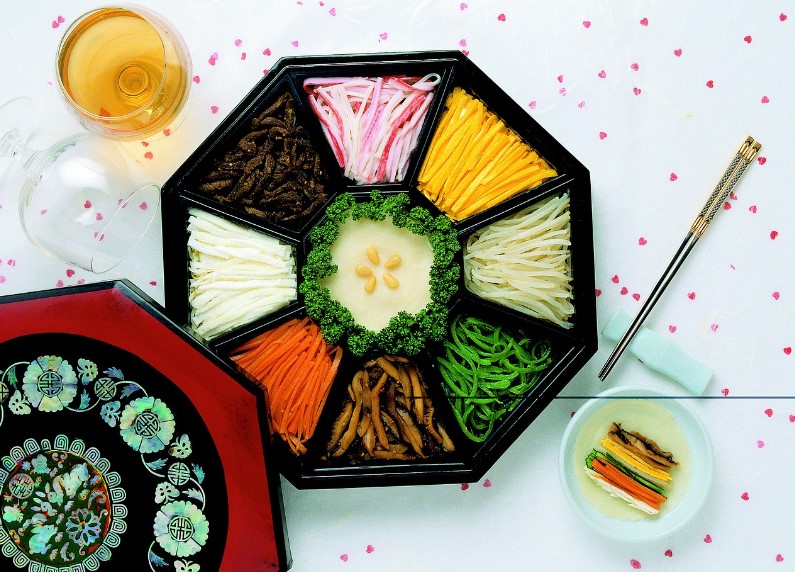Korean cuisine is known not only for its bold flavors but also for its focus on health and wellness. Many traditional dishes are designed to promote good health, using natural ingredients and fermentation techniques. Let’s explore some of the most popular healthy Korean foods that are both delicious and packed with nutrients.

1. Samgyetang (삼계탕)
Samgyetang, or ginseng chicken soup, is one of Korea’s most well-known health foods, traditionally eaten during the hottest days of summer. This hearty dish consists of a whole young chicken stuffed with glutinous rice, garlic, jujubes, and ginseng, all simmered in a light broth. The medicinal properties of ginseng are believed to improve stamina and boost energy, making this dish particularly beneficial for those recovering from illness or needing a health boost. The warmth and nourishing ingredients make it the perfect comfort food.
2. Doenjang Jjigae (된장찌개)
Doenjang jjigae is not just a flavorful stew; it’s also a highly nutritious dish made with doenjang, a fermented soybean paste rich in probiotics, which are great for digestion and gut health. This stew is typically cooked with tofu, mushrooms, and vegetables, providing a good balance of protein, fiber, and vitamins. The fermentation process of the soybean paste adds a depth of flavor and beneficial bacteria, making it a hearty yet health-conscious choice for everyday meals.
3. Bibimbap (비빔밥)
Bibimbap is a colorful, balanced dish that combines steamed rice with a variety of namul (seasoned vegetables), lean meats (optional), and a fried egg. The ingredients are mixed together with gochujang (Korean red chili paste), which adds flavor and spice. Bibimbap is highly nutritious, as it contains a wide range of vegetables like spinach, bean sprouts, carrots, and mushrooms, which are full of vitamins and fiber. The diversity of ingredients ensures that you get a well-rounded, wholesome meal that’s also incredibly satisfying.
4. Boricha (보리차)
While not a dish, boricha (barley tea) is an essential part of Korean cuisine that is widely consumed for its health benefits. This tea is made by roasting barley grains and boiling them in water. Rich in antioxidants, barley tea is known to aid digestion, detoxify the body, and improve circulation. It’s often served cold in the summer or warm in the winter, making it a refreshing and healthy drink year-round.
5. Ssam (쌈)
Korean ssam (lettuce wraps) is a great way to enjoy healthy proteins like grilled meat or tofu, wrapped in fresh lettuce or perilla leaves. Served with a variety of side dishes like kimchi and ssamjang (a savory dipping sauce), ssam is a lighter, lower-carb way to enjoy Korean BBQ. The fresh greens provide vitamins, while the protein offers essential nutrients, and the sauces add flavor without excess calories. It’s a meal that feels indulgent but is, in fact, nutrient-rich and balanced.
Why Korean Food is Healthy
Korean food is often centered around natural, unprocessed ingredients like vegetables, fermented foods, and lean proteins. Fermented staples like kimchi and doenjang are rich in probiotics, which promote gut health and digestion. Meals are also built around balance—each dish is intended to provide harmony between flavors, textures, and nutrients, creating a meal that is not only satisfying but also health-conscious. The focus on shared meals encourages slower eating and mindful consumption, promoting better digestion.
Conclusion
Healthy Korean food is not just about the ingredients; it’s about the philosophy behind the dishes. Meals like samgyetang, doenjang jjigae, and bibimbap show how Korean cuisine nurtures the body with nutrient-dense, balanced, and flavorful dishes. Whether it’s through the natural probiotics of fermented foods or the medicinal benefits of herbs like ginseng, Korean food provides a tasty and holistic approach to well-being, making it a perfect option for health-conscious eaters looking for a rich culinary experience.
